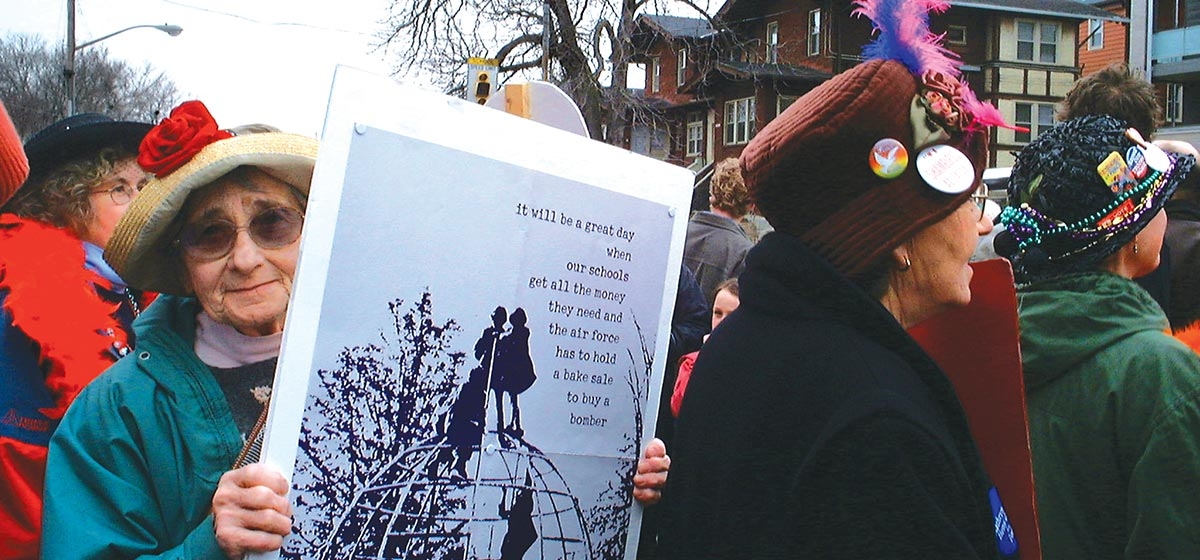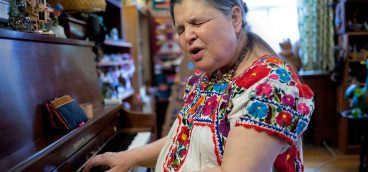
Sometimes we Raging Grannies create quite a stir. Being of a “certain age,” none of us ever expected to find ourselves before an audience, let alone exiting to applause. But there we are, clambering up on stages and platforms, wearing outrageous hats and running shoes, singing like canaries and loving it.
A feisty dozen women who coalesced five years ago, just before the war, we use stinging satire set to sweet melodies to rage about war, healthcare and social and economic justice. We think of ourselves, hopefully with humility, in the tradition of the wise women elders who preceded us in efforts to create a better world for their children, grandchildren and all who follow. Some would say we are off our rockers, and so we are, off our rockers and into the streets.
There are more than 60 gaggles of grannies across Canada and the United States with new chapters forming in Europe, Australia, New Zealand and Russia. The movement began in 1987 in Victoria, British Columbia, with a peace group protesting nuclear ships in Victoria Harbor. They called themselves Extenuating Circumstances and did street theater. Their first action was to present their legislator with a broken chocolate heart and a few songs on Valentine’s Day. When the members realized they were all older women, it was a natural to use the stereotype of an irascible old lady with a hat and umbrella as their image.
That old lady is often invisible in our society, and the strange garb is a bit of a ruse to catch the public’s attention. Once we have it, we turn the stereotype of the little old lady on its head.
Our Pittsburgh group formed in fall 2002 under the umbrella of the Thomas Merton Center, with some of us who had been inspired by hearing the Grannies in other cities. We’re between the ages of 50 and 85, not all grandmothers, and from various religious and ethnic backgrounds. We have a common goal of raising issues to challenge people’s thoughts and having some fun doing it.
No one, though, has to audition. As the Grannies from Halifax say, “If your heart is in the right place, don’t worry about where your vocal pitch is.” What counts is a sense of humor, outrage, a commitment to non-violence and a willingness to look foolish. I had my own problem with vanity and for the first few years wore rabbit ears rather than a frumpy hat. I’m working on that.
In those first few months, we learned a few songs, gathered hats, long skirts and shawls from Goodwill stores or the attic and made a rather shaky debut at the Merton Center dinner to an audience predisposed to love us.
Shortly after that, Mimi Yahn, an accomplished musician, singer and composer of political music, moved here from New Orleans. She was like Mary Poppins whipping the Banks family into shape; we began to sing on key, in harmony and on the beat. Lots of hard work for Mimi, but she sees it another way. “What it’s done for me is put music back into my life. It’s meant so much to me personally and politically… We really mesh!”
Since then, we’ve taken part in all the major anti-war demonstrations, raised some challenges outside the NRA convention in Pittsburgh, sung against the Patriot Act, about Wal-Mart’s treatment of its employees and raised awareness about similar employee issues at a local senior health care center. We’ve “Rocked Against Racism,” sang at International Women’s Day events, labor events and the Gay Pride Festival. We’ve performed at vigils and memorials for those who have died in the war, and we’re a familiar sight at the military recruitment center in Oakland.
One of our more interesting gigs was at that center. We followed the example of the Tucson Grannies and tried to enlist, not once but twice. As we gathered in September 2005, one of our members, Marcy Luek, read a statement in front of the locked doors of the center. It said in part: “We want to enlist in the U.S military forces to make possible the immediate return of all U.S. service personnel and to set an example of what REAL diplomacy can achieve. We would meet with Iraqi women and come to a mutual agreement of how best for Iraq to regain its own independence as all U.S. troops, bases and corporations leave their country.”
In February 2006, we did it again, as a “gift to our children and grandchildren.” This time we said, “We are grandmothers heartbroken over the huge loss of life and limb in Iraq.” When they heard we were coming, the recruitment center closed.
Edith Bell, 83, was among the Grannies present at both events. Before the first enlistment effort, she had received a letter from the Marines inviting her to enlist, because “of your facility with the Arabic language.” Edith speaks four languages: German, Dutch, Hebrew and English. She grew up in Nazi Germany and knows about loss of freedoms.
The group meets weekly in a member’s home in Highland Park to practice for gigs. We don’t beg off on these meetings; the topics are heavy, but the music is so much fun. We always warm up with our signature song, to the tune of “Side by Side.” “We’re a gaggle of grannies, urging you off of your fannies…” Then it might be “There’s No Business Like War Business” to the tune of “There’s No Business Like Show Business,” or “Hali, Hali Burton” to the tune of “Hava Nagilah.” If we’re feeling especially effervescent, we throw in a little fancy footwork. One of our new tunes is “Let’s Interpret the Geneva Convention,” a snappy song accompanied by a pair of maracas. For that timely topic, Mimi wrote the melody and lyrics.
As the world situation ricochets with dizzying speed, Mimi and Grannies throughout the country put it all to music. Sometimes, I picture the others, tiny demons in chenille robes and fuzzy slippers, bent over keyboards, fiendishly scribbling new verses to old tunes and shooting them out into cyberspace. That would not be our Mimi, though. She’s young by Granny standards, 52, and wears stretch pants and sweatshirts.
Eva Havlicsek, 58, from Fox Chapel, wanted to join early on but thought she didn’t qualify. “After 9/11, I began to attend any rally I knew about protesting the upcoming war and issues of civil liberties. It was at one of the rallies that I heard the Grannies, and as soon as I became a grandmother, I called the Thomas Merton Center to find out how to join. The Grannies have saved my sanity. I knew I was not alone in my thoughts.”
Mary King, another member but not a grandmother, agrees with Eva. “There is no place on earth I’d rather be than with people to whom I don’t have to explain how I feel.” A high school teacher with two children, Mary describes herself as a “young 54” and sees the group as a way to act on her beliefs. “I went to the cemetery at Normandy with my father, who had been there for the invasion. And as we looked at all the crosses, my father said, ‘War is anachronistic. It can’t be. We have to find some other way to live on this earth rather than using weapons.’ That stayed with me. The reason I like being a Granny is because we describe ourselves as activists, and I like to be around people who inspire me. It keeps me honest.”
When we sang at a recent Ellis School event celebrating diversity, a few girls in the blush of youth asked if they could join us. We smiled kindly and recommended they look into the Radical Cheerleaders, a group of young women who do clever political parodies while jumping up and down. For the Grannies, they’ll just have to wait.





